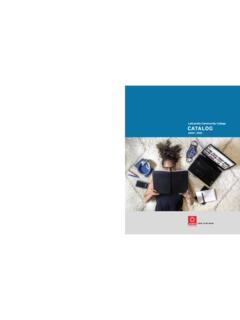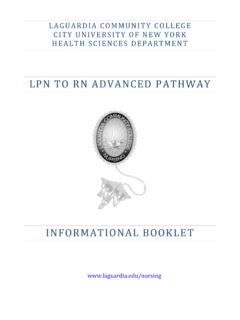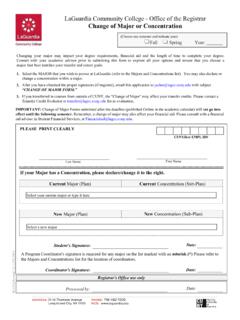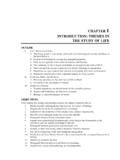Transcription of LAGUARDIA COMMUNITY COLLEGE DEPARTMENT OF …
1 LAGUARDIA COMMUNITY COLLEGE CITY UNIVERSITY OF NEW YORK DEPARTMENT OF NATURAL SCIENCE GENERAL BIOLOGY I SCB 201 Spring I, 2018 Lecture Instructor and lab Instructor: Lecture times: Office Hours: Lecture Text: biological Science (6th edition , 2017) by Scott Freeman; Pearson Benjamin Cummings, San Francisco, CA. biological Science, Books a la Carte Plus MasteringBiology with Pearson eText -- Access Card Package (Mastering Biology is not mandatory) Freeman et al ISBN: 9780134296029 (This is a loose leaf version carried by the bookstore and should be cheaper than the hardcopy version, new) Students who want to purchase access with eText for 24 months can do so at for $ (Note that this may be an option for students who plan on taking SCB 202 within the next year or so as the same book is used for both courses with SCB 202 using the sixth edition starting in the spring I.)
2 2018 session) Note that this is a new version of the text book. You may be unable to find this book used. The fifth edition of the text may be sufficient but note that the chapter numbers mentioned below refer to the sixth edition and may differ from the fifth. Note that the sixth edition will also be used for SCB 202 beginning in the spring I, 2018 session. Academic calendar: Students should note important dates on the academic calendar. Including irregular days such as Sept 19th (Friday schedule), holidays, last day to drop with refund, LECTURE OUTLINE (subject to change with notification). Note that the outline below lists TOPICS from each chapter.
3 In some cases, we may not cover all of the content in each chapter so it is advisable to consult the lecture notes posted on blackboard as well as your own notes from class then refer to the text for more in depth coverage of material rather than trying to memorize EVERYTHING in the book. Date Lecture topic (note: specific chapter title in book may vary from general topic listed here) Week 1 Intro/basic chemistry (chapters 1 and 2) Week 2 biological chemistry, macromolecules, enzymes cells and cell membranes (Topics from chapters 2-6, 8 ) Week 3 QUIZ 1 (topics from ch 1-6, 8), Cell structure and function (chapter 7), Cell respiration (Chapter 9) Week 4 Cell respiration continued (chapter 9), Photosynthesis (chapter 10) Week 5 QUIZ 2 (Topics from ch 7, 9, 10) Cell Cycle and Mitosis (chapter 12), Meiosis (chapter 13) Week 6 Principles of Mendelism (chapter 14), DNA synthesis (Chapter 15) Week 7 MIDTERM (Topics from chapters 1-10,12-15) How genes work (ch 16)
4 , Transcription (chapter 17) Week 8 Transcription continued (chapter 17), Translation (chapter 17), Control of gene expression in Prokaryotes (chapter 18) Week 9 QUIZ 3 (Topics from ch 14-18) Eukaryotic gene expression (chapter 19), Introduction to genetic engineering/biotechnology (chapter 20), Week 10 The Genome (chapter 20) Principles of Development (chapter 21), animal Development (topics from ch 47) Week 11 QUIZ 4 (Topics from ch 19-21, and 47) Principles of Evolution, Natural Selection (chapter 22), Evolutionary Processes, Speciation (chapter 23,24) Week 12 QUIZ 5 (Topics from ch 22-24, and 47) History of life (chapter 25) Finals week FINAL EXAM December 12th (Topics from chapters 16-25, and 47) GRADING CRITERIA Attendance: Students are strongly encouraged to attend all lecture sessions.
5 Text study alone is insufficient since many topics may be augmented or additional topics may be covered in lecture. Students are required to take all exams and no make-up quizzes will be given (without consultation). Laboratory attendance is mandatory. Grades: Seven exams will be given in lecture: 5 quizzes, a midterm exam and a final exam. The midterm and final exams are each counted as two quizzes. Lecture quizzes and tests will consist of a mixture of multiple choice and short answer type questions. Four exams will be given in laboratory (none dropped). Lab exams will consist of short answer type questions based on material covered in the LAB. Typically, these will ask you to understand WHY you did what you did in the lab.
6 You can also expect a microscope practical (hands on) to appear on the final lab quiz. Both the lecture average and laboratory average contribute to a single final average. The final grade is computed from the combined lecture and laboratory average, with 66% of the final grade from the lecture average and 34% from the laboratory average Effort in the laboratory will be considered in borderline cases. Each Quiz = of final grade (Total 33%) [The lowest quiz is dropped before averaging] Midterm and Final each = of final grade (Total 33%) Laboratory exams (x4) each = 6% of final grade (Total 24%) Laboratory reports (x4) = of final grade (Total 10%) Total Points/Percentage (rounded) Final Grade 94-100 A 90-93 A- 87-89 B+ 84-86 B 80-83 B- 77-79 C+ 74-76 C 70-73 C- 67-69 D+ 64-66 D 60-63 D- Blackboard.
7 Lecture notes will be posted in advance on blackboard as will other useful information including grades, review sheets, class announcements, etc. Students are advised to check blackboard frequently for information related to class. Students are advised NOT to try and contact me via blackboard as it often does not work. You can reach me by the email listed at the top of this syllabus. LAGUARDIA email: For some reason, students don t like to check their LAGUARDIA email. This is the only way I have to reach you. Please check it frequently. I would recommend checking it before you leave for class every day in case there is some last minute announcement or cancellation.
8 You may often find announcements about events, scholarships, or other happenings at the COLLEGE here so it is in your best interests to get in the habit of checking it frequently! ePortfolio: Note that students will be required to deposit at least one laboratory assignment in their personal ePortfolio. If you are unfamiliar with ePorftolio, basic info and tutorials can be found here: Laboratory Text: SCB201 General Biology I, Keller. Alzeory and Fuentes (2016) Bluedoor publishing 2nd edition . Note that is a custom lab manual and may be difficult to find outside of the LAGUARDIA Bookstore. Students are encouraged to have this on the first day of lab class.
9 LABORATORY OUTLINE (subject to change by lab instructor) . Lab Topic Lab Text Reference 1 The Microscope and Measurements pp. 1-11 and 15-31 2 Organic Molecules pp. 33-46 3 Diffusion and Osmosis pp. 49-62 4 Exam I on Labs 1, 2 and 3 , lab report 1 due Enzymes pp. 65-78 5 Cell Respiration pp. 81-90 6 Exam II on Labs 4 and 5, lab report 2 due Photosynthesis pp. 93-108 7 Mitosis and Meiosis pp. 111-123 8 Introduction to genetics pp. 127-140 9 Exam III on Labs pp. 143-150 6, 7 and 8, lab report 3 due Biotechnology and intro to PCR pp. 154-160, pp. 167-184 10 11 PCR-based forensics lab Evolution 167-184 contd. pp. 187-200 12 Evolutionary mechanisms pp.
10 203-216 Finals Week Exam IV, lab report 4 The COLLEGE s regulations regarding cheating will be strictly enforced. The policy on academic integrity is available at the following address: FUNDAMENTALS OF BIOLOGY I -- SCB 201 COURSE OBJECTIVES These are some of the core concepts you will be expected to learn from each hour of class. Of course, there are not the ONLY concepts you will be expected to learn but they can help serve as a framework to guide your studying and learning. NOTE: Each session generally corresponds to 1 class hour. General topics listed may differ from specific chapter titles found in your textbook. Subject to change WITH notice from your instructor.



















